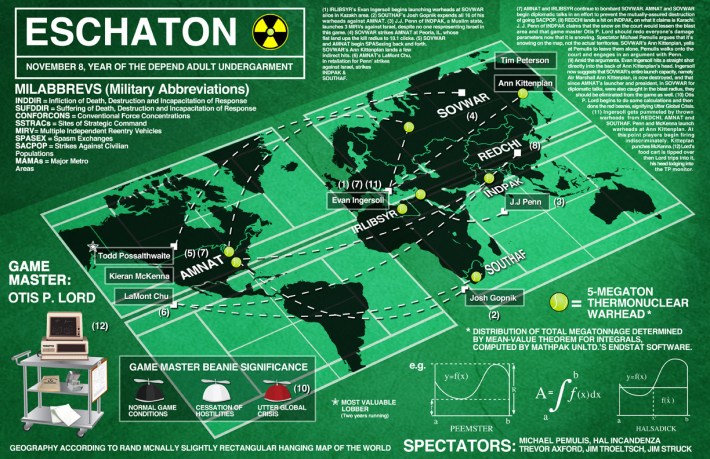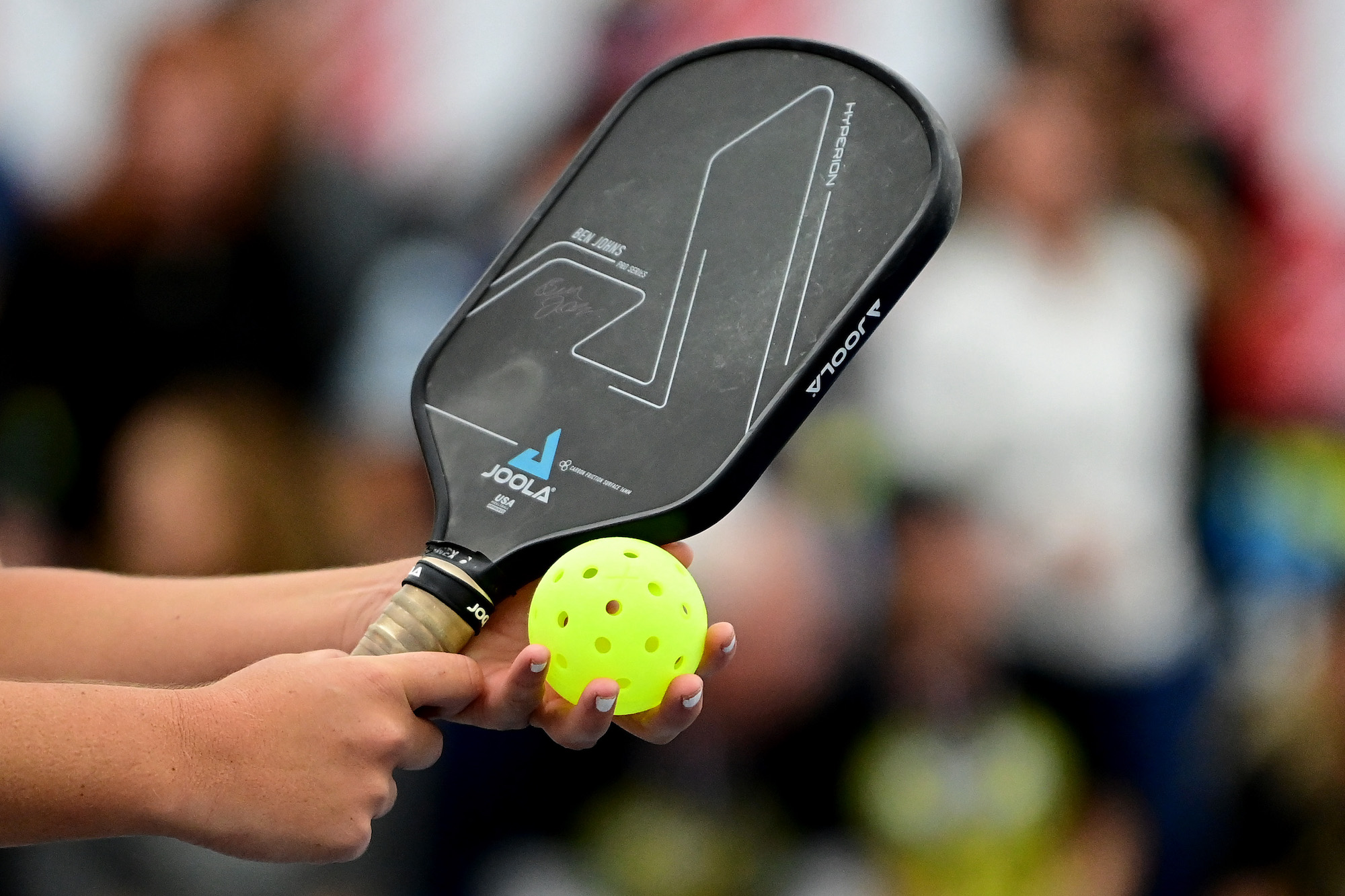Pickleball! It's sweeping the nation, with its plinks and plunks, at an incongruously rapid pace. The smaller, slower, lamer version of tennis is everywhere you look. It's taken over basketball courts. It's taken over the rink. It's taken over the old Bed Bath & Beyond. It's expanding at a rate both parabolic and probably fake. Pickleball's rise is unsettling a lot of people, some of whom think it's a psyop—cui bono?—but I find it hard to get too upset, given that it's providing exercise and socialization for a cadre that might not be getting them otherwise. And those who have played it invariably insist that it's actually very fun. But playing it is one thing, and herein lies the biggest obstacle to the sport's full takeover of the nation:
Pickleball is absolute murder to watch.
my god this is embarrassing. how is this geriatric hobby on regular espn. pic.twitter.com/HJoJLwZASP
— bobby (@bobby) July 30, 2023
I cannot really fault a sports network that has 168 programming hours per week to fill for chucking something on air that is at least recognizably sporty and has very cheap broadcast rights, but this shit is boring. This is not going to be the next tennis. It's not even going to be the next jai alai, since you can't bet on it. Pickleball is a black hole of excitement as a spectator sport.
Pickleball feels like some sort of elaborate experiment to see just what we'll watch. Riveting. pic.twitter.com/ADggTfPsCS
— CJ Fogler account may or may not be notable (@cjzero) August 6, 2023
The plastic ball is too light and the court too small to make for anything but endless rallies that look like the players are deliberately trying not to win. It is fine for the casual player unskilled enough to make the mistakes necessary to end a point, but professional pickleball is never going to cut it as a live or televised event. Unless. Unless?
Unless we mash up pickleball with the sport of eschaton from Infinite Jest.
I've likely made everyone mad now, because David Foster Wallace is possibly the only thing as polarizing as pickleball. (If you care, I'm lukewarm on some of his works, high on others, definitely not smart enough to understand a few, but I think Infinite Jest slaps.) But these are two acquired tastes that'll taste great together.
Eschaton is a game invented and played by students at the novel's tennis academy, most notably in a thrilling mid-book sequence that runs 20 pages, plus, in typical Wallace style, a math-heavy endnote that runs three damn whole pages in tiny endnote font. Eschaton is part tennis, part WarGames, part Risk. The space of multiple tennis courts represents a map of the world, and various pieces of clothing are strewn about to represent submarines and missile launchers and such. The game is nuclear war, and tennis balls representing ICBMs are lobbed into opposing territories, perhaps deflected, perhaps returned. The goal is survival.

It is more complicated than that. Much, much more complicated. (The sort-of dungeon master of an eschaton game wears a propeller beanie whose color represents the worldwide risk level. When a "worst-case-&-utterly-decontrolled-Armageddon-type situation" is reached, he spins the propeller as fast as he can. You could probably skip the beanie if you wanted to play this in real life.)
People have tried to play eschaton, or a quidditch-esque simplified version of it, and failed. It's too complex and too massive, with too many moving parts to really appreciate or enjoy on its own merits. It makes for a better novel setpiece, where the complexity is the joke, than it does a sport. Though it did make for a fun Decembrists video.
I submit that pickleball can save eschaton, and eschaton can save pickleball.
Tennis-eschaton is too difficult and takes up too much space to be workable (in the book, the map takes up six courts, not the four in the graphic above). But if we shrink things down to pickleball scale—maybe, say, four smaller pickleball courts, with teams of two—we have something more viable. The sluggishness of the ball will both draw out the tension of an incoming missile and make more difficult the act of returning it at a distance. The whole thing will be easier to follow. The players, unlike in actual pickleball, will have to run around. International teams representing their actual geo-political regions will offer more drama and more emotional connection than do some fit Gen-Xers from Tampa. Are you telling me you wouldn't go wild when Team USA vaporizes Chile into a radioactive crater? Don't even try to to tell me that.
In Infinite Jest, the eschaton game devolves into a brawl when players go rogue and start directly targeting their rival world leaders. It's a spectacular achievement in physical comedy:
Timmy Peterson takes a ball in the groin and goes down like a sack of refined flour. Everybody's scooping up spent warheads and totally unrealistically refiring them. The fences shudder and sing as balls rain against them. Ingersoll now resembles some sort of animal that's been run over in the road. [...] Ann Kittenplan has dropped her racquet and is charging McKenna. She takes two contact-bursts in the breast-area before she gets to him and lays McKenna out with an impressive left cross. LaMont Chu tackles Todd Possalthwaite from behind. Struck looks to have wet his pants in his sleep. J. J. Penn slips on a grounded warhead near Fiji and goes spectacularly down. The snowfall makes everything gauzy and terribly clear at the same time, eliminating all visual background so that the map's action seems stark and surreal. Nobody's using tennis balls now anymore. Josh Gopnik punches LaMont Chu in the stomach, and LaMont Chu yells that he's been punched in the stomach. Ann Kittenplan has Kieran McKenna in a headlock and is punching him repeatedly on the top of the skull. Otis P. Lord lets down the beach umbrella and starts pushing his crazy-wheeled food cart at a diskette-rattling clip toward 12's open south gate, still flicking furiously at the red beanie's propeller.
I'd be OK with seeing that on ESPN, too.






